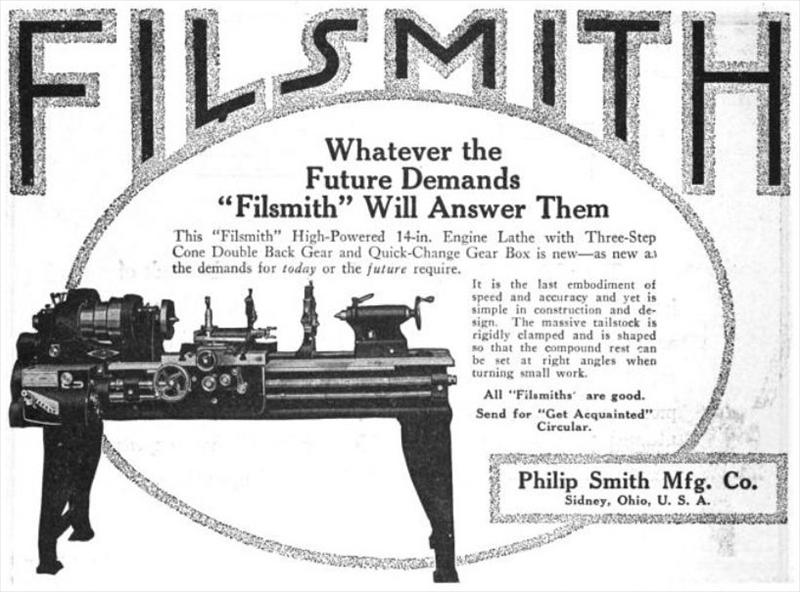This company traces its roots back before 1875 when Reinhardt Schmidt ("Smith") set up a foundry. He was joined by sons Philip Smith and Reinhardt Smith, with Philip eventually taking over ownership. The Philip Smith Co. (also Philip Smith Manufacturing Co.) made agricultural equipment and steam engines. In 1904 the business was formally incorporated as a stock company, with Smith as manager, and Lafayette Studevant and B. D. Heck as partners. Smith retired from the company in 1907. By 1917 they were making "Filsmith" 13- and 14-inch engine lathes. This seems to have been a short-lived effort—there were a glut of engine lathe manufacturers during that time, and many of them failed following the end of World War I. So far as we can tell, the lathe, but not the company, disappeared from the market around 1919 or '20.

From the 1919-01-02 American Machinist
In the early 1920s the Philip Smith Manufacturing Co., was acquired by a group of investors and renamed to the Sidney Grain Machinery Co.. That company survived and thrived until the 1960s when it hit hard times. In 1966 the company failed and some of its assets were acquired by the newly formed Sidney Grain Machine, Inc., with a specialty, as with their predecessor, in grain handling machinery. They gradually diversified into handling of other dry bulk materials, and in 1990 the company name was changed to reflect this diversification, to the Sidney Manufacturing Co., under which name they are still in business.
Information Sources
- Company website's history page.
- Volume I of the 1919 book Memoirs of the Miami Valley.
Philip Smith, the son of an honest but unlettered emigrant named Reinhardt Schmidt, who had settled first in Pennsylvania, afterward migrating to Indiana, and then to Dayton, Ohio, where he entered a foundry and trained his sons in steel craft, came to Sidney in advance of his father; but, after the fire was followed by the remainder of the family, Mr. Schmidt ("Smith"), senior, assisting in getting the new foundry built on the site of the old. The elder Smith lived, active in the business of the foundry, until 1875, and was no small part of his son's success. Philip Smith, little better educated than his father, had a very engaging personality and possessed a marked degree of diplomacy as well as mechanical genius, all of which was employed in enlisting the help which he often needed in financial straits; and by the advice and good offices ot several able financial heads in Sidney, he was enabled at last to withdraw from the manufacturing field a wealthy man. He died in 1914. Rhinehart Smith, a brother, was long associated with him in the business.
In the Philip Smith foundry and machine works, where were manufactured many different grain-handling machines for farmers' and warehouse use, with other machines of various character, stationary engines, and all sorts of foundry products for which the plant was available, a number of Sidney's best men have from time to time exerted a saving hand. But it has been a valuable institution and an asset to the town well worth the saving.
...About 1904 the industry was put upon a sound financial basis by the formation of a stock company, the partners being Lafayette M. Studevant and B. D. Heck, Mr. Smith becoming manager until 1907, when he resigned. Since that time the business has had a splendid growth, the receipts having more than trebled in the years between 1915 and 1918.